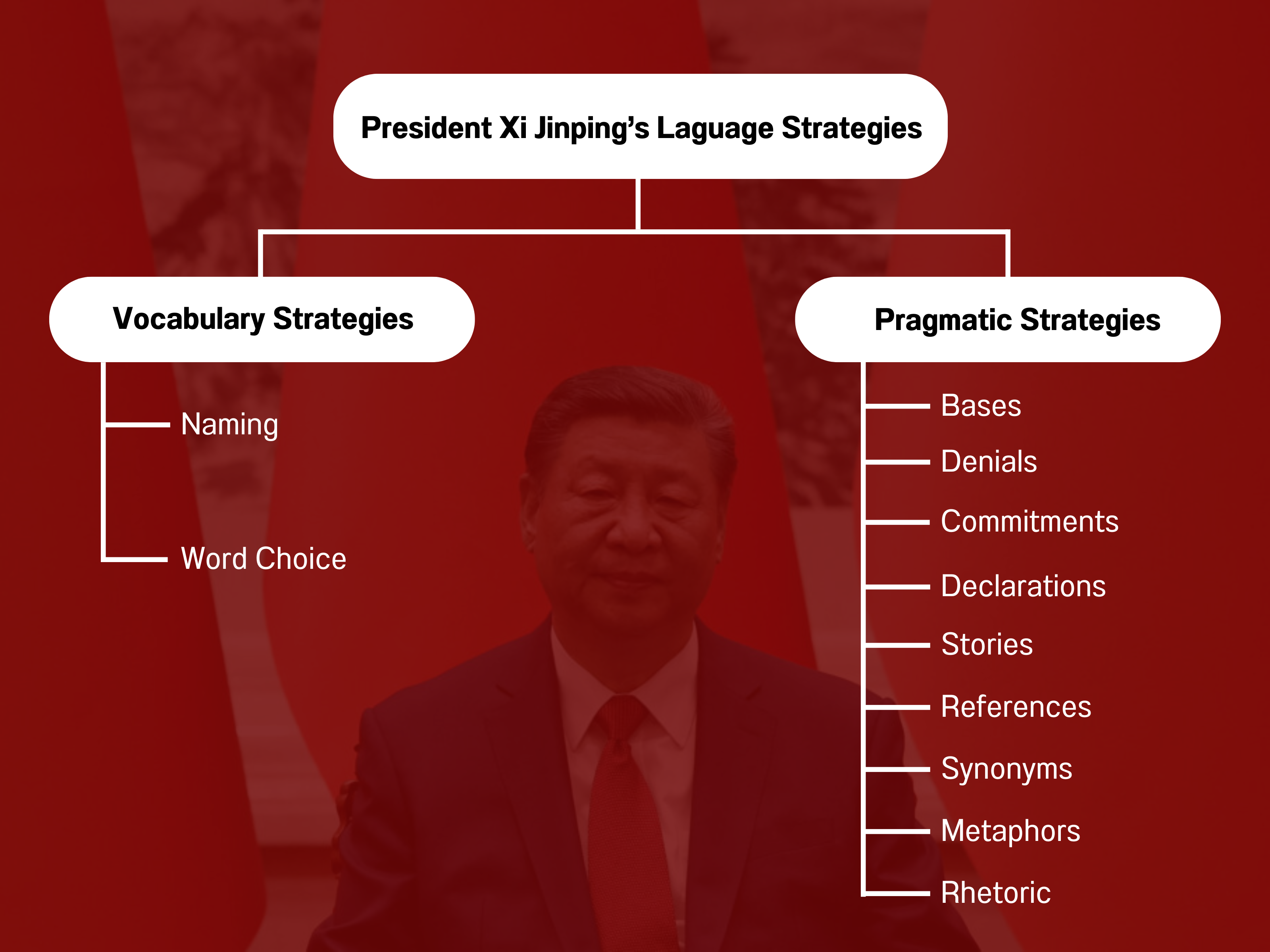Discourse Analysis: Regarding the Issue of President Xi Jinping’s China-Taiwan Reunification
Main Article Content
Abstract
Objectives: This article aims to study the strategies for meaning construction in China’s diplomatic discourse towards Taiwan, and to examine the ideology that affects the construction of diplomatic discourse in the rhetoric of President Xi Jinping from 2013 to 2023.
Methods: The study employed the concept of critical discourse analysis with the application of Norman Fairclough’s dimensions of discourse.
Results: The study reveals that President Xi Jinping utilized two language strategies: 1) vocabulary strategies, such as naming and word choice; and 2) pragmatic strategies, including the use of bases, denials, commitments, declarations, stories, claims, intertextuality, metaphors, and rhetoric. Regarding the ideologies affecting the discourse construction, the discourse of the Chinese leader reflects four ideologies: 1) reproducing Chineseness and sinicization, 2) unification, 3) polarization, and 4) conditional violence.
Application of this study: This study serves as a case study on the application of discourse analysis in examining discourse construction strategies and also reveals the ideologies embedded within the discourse.
Downloads
Article Details

This work is licensed under a Creative Commons Attribution-NonCommercial-NoDerivatives 4.0 International License.
References
Althusser, L. (2014). Ideology and ideological state apparatuses (K. Kaewthep, Trans.). Bangkok: Siamparitut Publishing. (In Thai)
Angkapanichkit, J. (2019). Discourse analysis. Bangkok: Thammasat University Press. (In Thai)
BBC. (2022). The 30th Anniversary of the “1992 Consensus”: Peace Dividends under “One China, Each Table” and Concerns of the Narrowed “One Country, One System”. Retrieved 30 December 2023, from https://www.bbc.com/zhongwen/simp/chinese-news- 63397718 (In Chinese)
Cabral, S. (2022). Pelosi Taiwan visit: Beijing vows consequences if US politician travels to island. BBC. Retrieved 30 December 2023, from https://www.bbc.com/news/world-uscanada-62310576
Charoensin-o-larn, C. (2011). Development discourse: power knowledge truth identity and Otherness. 5th ed. Bangkok: Vibhasa. (In Thai)
China National Radio. (2019). Learning allusions: The soul of the country is transformed by literature and cast by literature. Retrieved 31 December 2023 from https://mp.weixin.qq.com (In Chinese)
Fairclough, N. (1995a). Critical discourse analysis: The critical study of language. London: Longman
Fairclough, N. (1995b). Media discourse. London: Arnold.
Guxin, C. (2019). A comparative study on the Chinese dream and the American dream. Advances in social science, education and humanities research, 32, 571-574.
Lakoff, G., & Johnson, M. (1980). Metaphor we live by. Chicago: The University of Chicago Press.
Panpothong, N. (2013). Critical Discourse Analysis based on linguistics. Bangkok: Faculty of Arts, Chulalongkorn University, Thailand. (In Thai)
People’s Daily. (2017). Xi Jinping's report at the 19th National Congress of the Communist Party of China. Retrieved 30 December 2023, from http://cpc.people.com.cn/n1/2017/1028/c64094-29613660.html (In Chinese)
Qiushi. (2018). Xi Jinping: Speech at the First Session of the 13th National People’s Congress. Retrieved 30 December 2023, from https://www.gov.cn/xinwen/2020-05/15/content_5511909.htm (In Chinese)
Qiushi. (2023). Xi Jinping: Speech at the Forum on Cultural Inheritance and Development. Retrieved 30 December 2023, from http://www.news.cn/2023-08/31/c_1129837816.htm (In Chinese)
Sawasdi, P., & Nantachantoon, S. (2015). Strategies for using language to convey the ideology of femininity in advertisements for brand name fashion products. Silpakorn University e-Journal (Social Sciences, Humanities, and Arts), 35(3), 149-174. (In Thai)
Searle, J. R. (1979). Expression and meaning: Studies the theory of speech acts. USA: Cambridge University Press. DOI: https://doi.org/10.1017/CBO9780511609213
Tangyuenyong, P. (2015). Contemporary Chinese diplomatic discourse: Meaning & Role. Bangkok: CU Press. (In Thai)
The Mainland Affairs Council (TAIWAN). (2019). Mainstream public opinion in Taiwan opposes CCP’s “One Country, Two Systems” and “1992 Consensus”. Retrieved 30 December 2023, from https://www.mac.gov.tw/en/News_Content.aspx?n=2BA0753CBE348412&sms=E828F60C4AFBAF90&s=3B85805DF130EF34
van Dijk, T. A. (1998). Ideology: A multidisciplinary approach. London: Sage.
van Dijk, T. A. (1995). Discourse analysis as Ideology analysis. In C. Schaffner and A. Wenden (Eds.), Language and Peace. Dartmouth: Aldershot, 17-33.
van Dijk, T. A. (2006). Discourse and manipulation. Discourse & Society, 17(3), 359-383. DOI: https://doi.org/10.1177/0957926506060250
van Dijk, T. A. (2008). Discourse and power. Basingstoke: Palgrave Macmillan. DOI: https://doi.org/10.1007/978-1-137-07299-3
van Dijk, T. A. (2011). Discourse and ideology. In Discourse Studies: A Multidisciplinary Introduction. SAGE Publications Ltd: 379-407. DOI: https://doi.org/10.4135/9781446289068.n18
Wantana, S. (2001). Contemporary political ideologies. Nakhon Pathom: The National Agricultural Extension and Training Office Press.
Wen, G. & Gu, Q. (2019). President: not accept the 1992 Consensus and firmly opposes one country, two systems. Retrieved 30 December 2023, from https://www.cna.com.tw/news/firstnews/201901025003.aspx (In Chinese)
Xinhua News Agency. (2018). The First Session of the 13th National People’s Congress concluded in Beijing and Xi Jinping delivered an important speech. Retrieved 30 December 2023, from https://www.gov.cn/xinwen/2018-03/20/content5275963.htm (In Chinese)
Xinhua News Agency. (2019). Xi Jinping: Speech at the 40th Anniversary of the “Message to Compatriots in Taiwan”. Retrieved 30 December 2023, from http://cpc.people.com.cn/n1/2019/0102/c64094-30499664.html (In Chinese)
Xinhua News Agency. (2021). Xi Jinping: Speech at the Conference to Commemorate the 110th Anniversary of the Revolution of 1911. Retrieved 30 December 2023, from https://www.gov.cn/xinwen/2021-10/09/content_5641633.htm (In Chinese)
Xinhua News Agency. (2022). Xi Jinping: Hold high the great banner of socialism with Chinese characteristics and work together to build a modern socialist country in an all-round way - Report at the 20th National Congress of the Communist Party of China. Retrieved 30 December 2023, from https://www.gov.cn/xinwen/202210/25/content_5721685.htm (In Chinese)
Xinhua News Agency. (2023a). Xi Jinping: Speech at the First Session of the 14th National People’s Congress. Retrieved 30 December 2023, from https://www.gov.cn/xinwen/2023-03/13/content_5746530.htm (In Chinese)
Xinhua News Agency. (2023b). Xi Jinping’s congratulatory letter to the Sixth Cross-Strait Youth Development Forum. Retrieved 30 December 2023, http://www.news.cn/politics/leaders/2023-09/15/c_1129864607.htm (In Chinese)
Yao, S. (2019). Conceptual metaphors of “the Chinese Dream” and president Xi Jinping’s strategy for the governance of China. Journal of Letters, 48(1), 1-40. (In Thai) DOI: https://doi.org/10.58837/CHULA.JLETTERS.48.1.1
Zhu, X. (2020). China’s peaceful rise: A necessary path with challenges. Advances in social science, education and humanities research, 435, 81-84. DOI: https://doi.org/10.2991/assehr.k.200428.019


